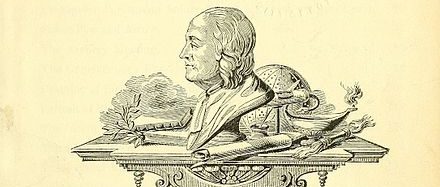

The things I do to try and get published

For the tenth time I sent manuscripts of my book of time travel stories, It’s About Time, for consideration to major publishers, Penguin, Hachette, Mcmillian, HarperCollins, Simon and Schuster, but they wrote back saying they were not interested. I stopped submitting my writings to them because I figured ten times was enough since I have ten fingers and ten toes and they are enough.
I came up with a new and I was sure a better way to get my writings published. I got in my time machine and traveled to 1839, Philadelphia, and the offices of Burton’s Gentleman’s Magazine, with the idea that due to a dearth of writers during that time period, they would enthusiastically consider what I’d written. With my manuscript tucked under my arm, I asked who I thought was the clerk if I could speak with the publisher, William Evans Burton. The clerk was a sickly, thin and malevolent man who said I could do no such thing. It was then I realized he was Edgar Allen Poe. I looked off and pretended that I was interested in a spider web on the ceiling. This was my way to not let on that I was in the ecstatic state of a celebrity sighting. Pre-1920s, the status of a celebrity hadn’t been invented. People we now consider as famous, back then were just another person who did something during the day.
I’d read that Poe was unkind to other writers, and so after calming down, I looked at him and said, “You must be Mr. Poe. I sincerely enjoyed reading your short story, Manuscript Found in a Bottle. I wish I’d written it.” Poe smiled. A writer loves to hear from other writers that they wish they’d written something the he or she wrote. It’s our way of saying that a power greater than us is the author our word musings, and sometimes the transmission we get is jack shit in comparison to the gems others receive.
Poe said he recently became an editor of the magazine and would be delighted to take a look at what I’d written. With huge misgivings I handed my manuscript to Mr. Poe. He said I should come back in a few hours to hear his assessments of my work.
I left and went for a stroll down the streets of Philadelphia. I came across The Betsy Ross Bespoke Tailoring and Victuals Shoppe. I went in and was met by a cantankerous elderly woman chewing tobacco and sewing a garment. I figured that was “her” and I looked up at where there wasn’t a spider web on the ceiling. Betsy spit her chaw onto my shoes and yelled at me that she had no time for skulking vagrants.
I left and walked a little further until I came across a street musician busking for pennies. He was singing Oh, Susanna, one of my favorite songs. I started to sing along. He stopped singing and asked how I knew that song since he’d only written it that morning. I realized it was the composer Stephen Foster, pre-fame. I looked at him with the celebrity stalker gaze, and he asked me if I was ill. I’d forgotten to pretend look at the cobwebs on the ceiling because we were outdoors. I lied that I wasn’t feeling well, left a dollar in his jar, and went back to walking. From behind I heard him exclaim about the dollar, but then with disdain blurt out that it was counterfeit, the date on it being 2007.
I ran for blocks until I came to the wharf. I looked out at the water. Whenever I feel out of sorts while time traveling, I like to spend time near trees or water because of their relaxing effects. Though after a few minutes, the putrid smell of rotting fish from fisherman’s boats made me nauseous and I left.
I returned to Burton’s Gentleman’s Magazine, only to discover that Poe had sold my stories to Burton, claiming that he was the author. I called out Poe for being a liar and he slapped my face with his glove and challenged me to a pistol duel. I met him an hour later in a field just outside the city.
Poe brought a box containing two pistols. I chose one and he the other. We marched twenty paces away from one another, turned and fired. My shoulder had been grazed. When the smoke cleared, I saw that Poe lay dying. I went up to him, hoping he would apologize for stealing my stories. Instead he was happy that his dying would help sell a great amount of copies of It’s About Time, making him the talk of the town. I mentioned that he would be dead and wouldn’t be able to enjoy the theft of popularity. He didn’t understand the point and died with a smile on his face.













Leave a Reply